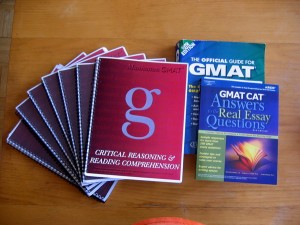 Virtually all business school applicants worry about whether their GMAT (or GRE) score is good enough for their target schools. If you’re deliberating whether it’s worth retaking the exam, the following might help you make your decision.
Virtually all business school applicants worry about whether their GMAT (or GRE) score is good enough for their target schools. If you’re deliberating whether it’s worth retaking the exam, the following might help you make your decision.
How Prepared Were You, Really?
How many weeks/months did you study? Did you use the best materials available, whether through a prep course or independent study? Did you take several full-length practice tests in test-like conditions (e.g. timed, no distractions, without stopping)? If you didn’t truly give preparation your all, you will likely be surprised to see how much you can improve with a head-down, intensive study effort.
For a personal anecdote, I came into my prep course scoring a 590. 6 weeks later, after a hardcore study effort, I earned a 740 on test day. GMAT tutors regularly score 800s when they sit for the exam – are they all prodigies, or freaks of nature? No. They’ve just dedicated themselves to mastering the material. And you can too. It’s entirely learnable.
Did You Face Extenuating Circumstances on Test Day?
Were you completely prepared only to find yourself sick the morning of the exam? Or distracted by a major life crisis? Did you just have an unexplainable “off” day? If you had been scoring well on your practice exams, then certainly make the effort to give it another go. Don’t leave anything on the table.
Were You a Bundle of Nerves?
Do you have such major performance anxiety that, despite scoring well on your practice exams, you just can’t pull it off anything close when it counts. You’re not alone. Everyone from athletes to singers/actors to politicians/executives have learned to manage their nerves on “the big day” through professional counseling, self-help books, meditation, yoga, courses and coaching dedicated to performance anxiety. One interesting option is through Test Prep NY/SF who has a specialized practice for anxious GMAT takers. Your willingness to invest in this area will benefit you throughout your career.
Where Do You Fall Within the Class Profile?
Look up the class profiles online for your target schools. Most schools publish an 80% GMAT range – i.e. the range of GMAT scores in which 80% of last year’s class fell. Your goal should be to score as high as possible within that range. If your dream school’s 80% GMAT range is 650-750 and you have a 640, then just know that your score is lower than at least 90% of their current students. (Yes 90%. Don’t forget the 10% who scored above 750.) Is that where you want to position yourself? We think it would be a smart idea for you to hit the books again. Moreover, if your score is in range but very lopsided (e.g. 50% Q and 98% V), it may be worth retaking the exam to boost your quant score.
What Kind of Increase Can You Expect?
According to a GMAC study, the average gain from taking the GMAT a second time was 33 points. However, the higher the initial score, the smaller the gain. Those with initial scores of 500-590 improved an average of 30 points on their second attempt, yet for those whose initial scores were 700+, the average gain was only eight points. Additionally, 25% actually scored lower on their second attempt. As for third and fourth attempts, those who had already hit the 600+ mark saw very little improvement.
Have You Already Taken it Enough Times?
If you’ve taken the exam three, four, five times and still do not have the results you were hoping for, it’s time to move on. The admissions committee would honestly rather see you focus on the other aspects of your application at that point. If your profile still lacks a strong quantitative component, find other ways to prove yourself: step up for a data analysis project at work, enroll in a statistics or finance class at your local college and get an A. Or if you have time to spare, perhaps the GRE is a good alternative for you.
Ultimately, while the GMAT is very important, it is not the sole determinant of your success/failure in the application process. So before losing faith in your existing score, consider how it fits in with your entire profile: academic, professional, extracurricular, and personal. You just might be in better shape than you think. If not, it may be time to revise your list of target schools to those more in line with your performance.
[We’d like to thank Brett Ethridge, Founder of Dominate The GMAT, for his contributions to this post.]
[To discuss whether your GMAT is competitive enough for your target schools, or for general MBA admissions advice, contact us at info@shineadmissions.com]
© Shine/ MBA Admissions Consulting, May 2 2015, 11:02am MT
